India election 2019: 25-29 March the week that was
- Published
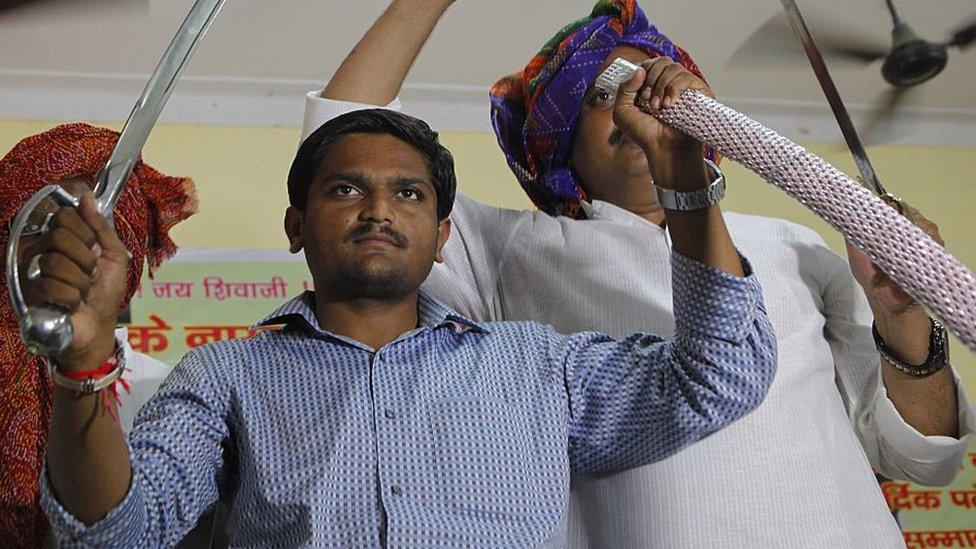
India has entered full election mode: voting is due to begin on 11 April, with the final ballot cast more than five weeks later on 19 May. Every day, the BBC will be bringing you all the latest updates on the twists and turns of the world's largest democracy.
On Friday... a key Modi challenger was ruled out
What happened?
Hardik Patel, the firebrand social activist who rose to fame challenging Prime Minister Narendra Modi in his home state of Gujarat, won't be able to contest the election after a court ruling.
The Gujarat high court refused to stay his conviction in a 2015 rioting case. Under India's laws a convicted person cannot stand for election unless the conviction is stayed.
His lawyer told reporters that they will appeal in the Supreme Court soon.
Mr Patel joined the opposition Congress party earlier this month and has appeared on stage with party leaders Rahul Gandhi and Priyanka Gandhi.
Why is this important?
Mr Patel's decision to join the Congress was seen as a significant victory for the party.
His speeches and fiery oratory have attracted millions of supporters - many of whom have traditionally voted for Mr Modi's Hindu nationalist Bharatiya Janata Party (BJP), which has ruled Gujarat for more than two decades.
"He brings mass appeal for the Congress, which is something the party has desperately sought in the past 20 years," said Ankur Jain, BBC Gujarati's editor.
Mr Patel has been seen as a strong threat to the BJP ever since 2015, when caste protests took off in Gujarat. "He became a prominent voice of dissent for shaking up the status quo in the state," our editor explained.
Mr Patel had previously said that the BJP was "scared" of him and was "trying every trick in the book" to ensure that he would not be able to contest.
However, he said in that event, he would still campaign to get the Congress candidates elected in Gujarat and the rest of the country.

And Modi biopic producers denied links to his party
What happened?
A gushing film about the prime minister is scheduled for release on April 5 - days before the first stage of voting begins.
The opposition Congress party has called on the Election Commission (EC) to delay the release of the "biopic" called PM Narendra Modi until after the election, saying that to release it as planned would violate election rules known as the model code of conduct.
The EC had asked the film's producers to make their case and they now have, saying that the have no links to the BJP and that they used their personal funds to finance the film.
"The allegations made linking our client's movie with a political party merely on a few public events, Facebook posts and tweets are not only false but have no basis in either fact and/or law," a lawyer for the producers was quoted by the Indian Express newspaper as saying.
Why does this matter?
The lead-up to these elections has seen an unprecedented number of political films but PM Narendra Modi, starring Vivek Oberoi in the title role, is the most controversial.
Judging by the trailer, it paints a fawning picture of India's leader. Many critics have already written it off as a hagiography, pointing out that BJP President Amit Shah has helped to promote it.
If the Election Commission decides to ban it. Congress will be very pleased. But the producers say such a ruling would violate freedom of expression.
Allow YouTube content?
This article contains content provided by Google YouTube. We ask for your permission before anything is loaded, as they may be using cookies and other technologies. You may want to read Google’s cookie policy, external and privacy policy, external before accepting. To view this content choose ‘accept and continue’.


On Thursday... the PM held his first rallies
What happened?
PM Narendra Modi kicked off his campaign for the upcoming elections with a rally in Meerut, a city in northern Uttar Pradesh state.
After he addressed the crowds there, Mr Modi travelled two other rallies - one in Jammu and the other in Uttarakhand.
Why does this matter?
This was Mr Modi's first big speech this campaign, and was therefore being watched very closely.
He focused on national security as expected, saying that only his government had the "courage" to carry out air strikes in Pakistan. He was referring to government claims that it hit militant camps inside Pakistani territory after a suicide attack in Indian-administered Kashmir that killed 40 troops last month.
Our BBC correspondents were at the rally in Meerut and sent us some pictures of the crowds. People are wearing "chowkidar" or "watchman" T-shirts.
Mr Modi has used the term for a while, telling Indians that he is their "watchman" - someone who looks out for them and serves them.
But in recent weeks, he has really upped the ante, even changing his Twitter handle to "Chowkidar Narendra Modi" - prompting senior members of his cabinet and many supporters to do the same.
Analysts say it is a clever use of the term to address the issue of national security.
And it appears to have worked since many at the rally could be heard referring to India's relations with Pakistan, national security and "surgical strikes" even before it began, the BBC's Geeta Pandey said.
Mr Modi also attacked the opposition Congress party's election pledge of a minimum income guarantee scheme, calling it a "big sham".
The crowd at the venue was not massive, but those gathered were very excited at the prospect of seeing Mr Modi, our correspondent addsed.
They cheered and clapped enthusiastically as they chanted "Modi! Modi!"
In his typical style, Mr Modi would start a sentence and the crowd would finish it for him.
"Every time you press the button [for the BJP], you're voting for me," he said as he concluded his speech.
Mr Modi has consistently remained his party's main vote-getter.
Correspondents who have been covering the election say that Mr Modi seems to have transcended any disenchantment that voters feel towards his party's MPs.
The BBC's Soutik Biswas says that this is likely to be a presidential-style faceoff in a parliamentary election.
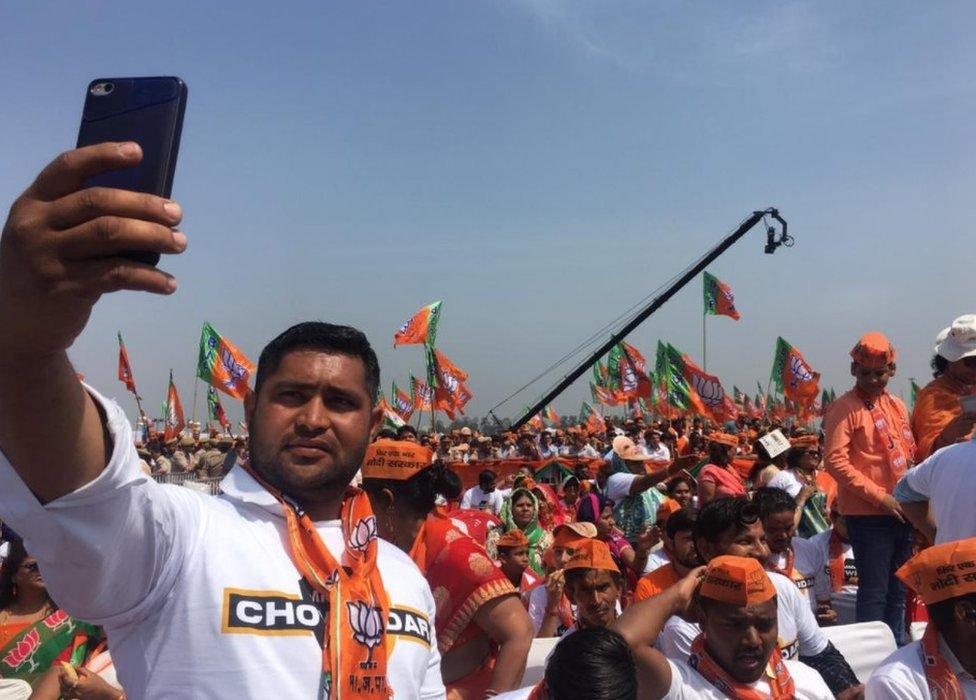
Modi merchandise was on sale at the rally for his biggest fans:
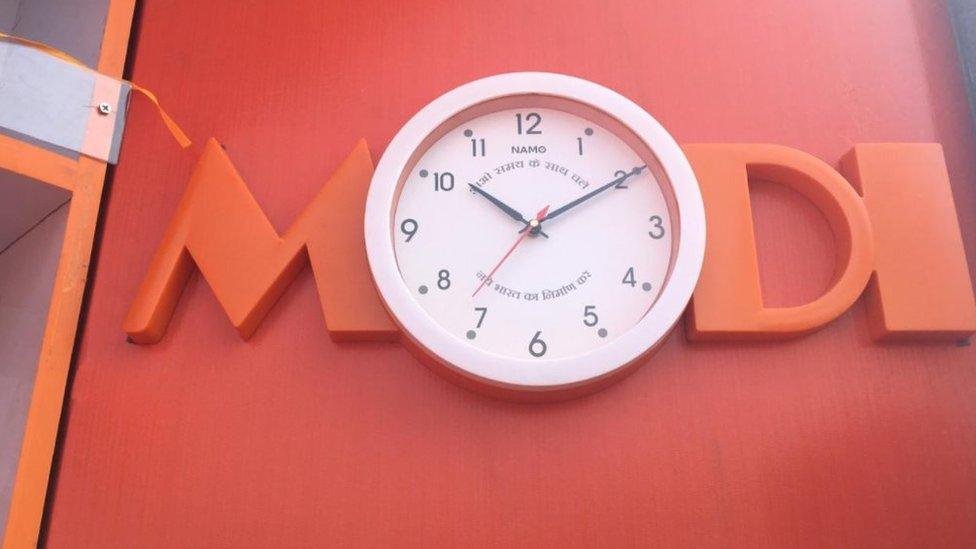
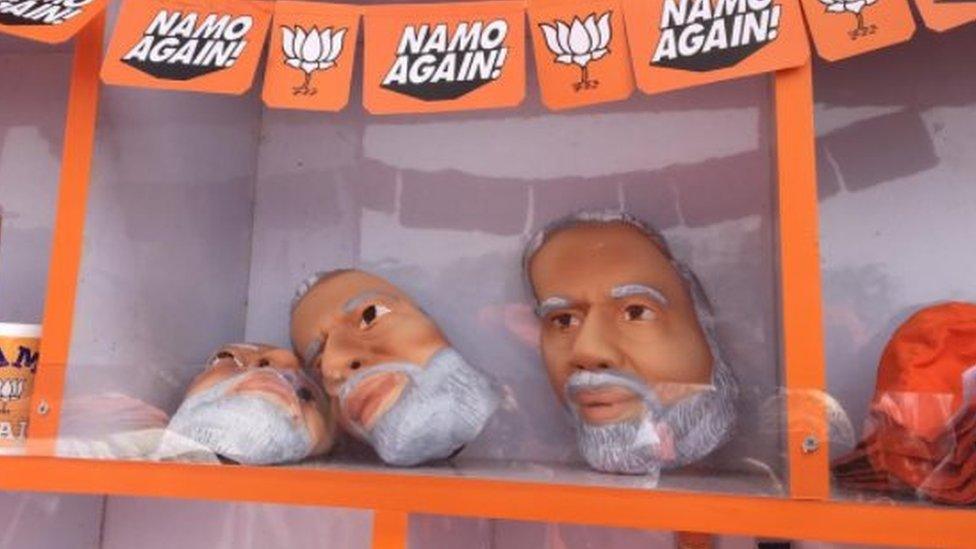

Questions were asked about Priyanka Gandhi's intentions
What happened?
Priyanka Gandhi, the sister of main opposition Congress party leader Rahul Gandhi, said that she would contest the upcoming election - if her party wanted her to.
"If my party wants me to, I will definitely do so," she told reporters in the northern state of Uttar Pradesh.
Her name did not appear in the Congress party's first list of candidates. She had however been listed as one of the party's "star speakers" who would be addressing rallies around the country.
Why does this matter?
Considered the more charismatic of the Gandhi siblings, she is often likened to her grandmother and former PM Indira Gandhi, which has served to bolster her popularity within the party and beyond.
Party workers who had lobbied hard for a larger role for her were left disappointed she didn't appear on the first candidate list.
This was clearly not what they had envisioned when she announced her "formal entry" into politics in January.
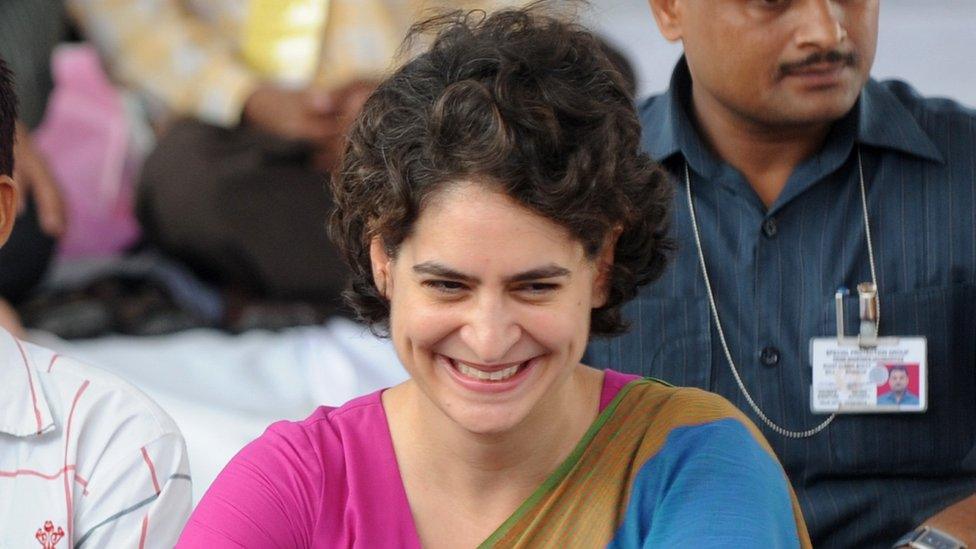
Priyanka Gandhi-Vadra announced her formal entry into politics in January
The announcement came soon after the Congress had suffered a blow - the two main regional parties in the politically crucial state of Uttar Pradesh decided to leave it out of a key alliance. So her entry was to ostensibly galvanise demoralised party members.
Therefore to say she was not running gave the impression that her entry was nothing but a half-hearted measure, and that the party was afraid that she could lose.
Which is why her announcement is significant.
It could well be that she may actually run, but even if she doesn't, she is sending a clear message that the party has a plan, and she is abiding by it.
But will this be enough to convince workers in the state?

Election authorities said they were looking into PM Modi's space address
What happened?
The Election Commission (EC) announced that it would investigate Prime Minister Narendra Modi's address to the nation on Wednesday.
In it, he announced that India had successfully shot down a low-orbit satellite in a missile test.
The commission has appointed a committee to look into whether the speech, which was only announced half an hour before it happened, violated any of its guidelines. The opposition has already alleged that it did.
Why does this matter?
Opposition parties immediately took aim at Mr Modi, claiming that the timing of his address was nothing but a blatant move to grab votes.
While the election commission rules do state that political parties announcing "achievements" in the media should be "avoided", it is still unclear whether Mr Modi's speech strictly violated that.
Former Chief Election Commissioner TS Krishnamurthy told BBC Tamil that there was "no provision" in the election guidelines about whether such an announcement would be a "violation".
"As he has addressed the nation in his capacity as PM, it doesn't seem to be a violation," he said.
Election guidelines, known in India as the model code of conduct, are a set of guidelines that are in place to ensure a level playing field for all parties.
However, this year the EC has had to deal with several cases which have tested the limits of the guidelines.
Apart from Mr Modi's speech, they have been asked to rule on a film about PM Modi. A new web series on Mr Modi, which will be out in April, could further complicate matters.
Earlier in March, the EC announced that its rules would also apply to social media for the first time.

On Wednesday... PM Modi made a 'big' announcement
What happened?
Prime Minister Narendra Modi made an unexpected address to the nation.
He said that India was now an "established space power" and in space's "super league" because it had successfully managed to shoot down a low-orbit satellite in a missile test.
He had earlier tweeted that he would be addressing the nation, without mentioning what he would be talking about, sparking fevered speculation.
Allow X content?
This article contains content provided by X. We ask for your permission before anything is loaded, as they may be using cookies and other technologies. You may want to read X’s cookie policy, external and privacy policy, external before accepting. To view this content choose ‘accept and continue’.

Why does this matter?
According to Mr Modi, with the successful launch of an anti-satellite missile (ASAT), India has become only the fourth country after the US, China and Russia to have this technology.
He said that it would "make India stronger, even more secure and will further peace and harmony".
Allow X content?
This article contains content provided by X. We ask for your permission before anything is loaded, as they may be using cookies and other technologies. You may want to read X’s cookie policy, external and privacy policy, external before accepting. To view this content choose ‘accept and continue’.
Jonathan Marcus, the BBC's defence correspondent, said the announcement was "yet one more aspect of the trend towards the militarisation of space".
He pointed out that the Trump administration has proposed establishing a fully-fledged "space force" as a separate element of its armed forces.
"The news will also lead to renewed calls from arms control advocates who see an urgent need to control this ongoing militarisation of space," says our correspondent.
When China carried out a similar test in 2007, external- destroying a weather satellite - it caused international alarm over a possible space arms race.
There are also concerns that the debris from such tests can harm civilian and military satellite operations. However, India said that it had intentionally carried out its test in the lower atmosphere to ensure that there was no debris and that whatever was left would "decay and fall back onto the earth within weeks".
The timing of the announcement has however raised questions.
With less than two weeks to go for a national election, the opposition has accused Mr Modi of trying to score political points and take credit for the achievements of the country's space agency.
West Bengal Chief Minister Mamata Banerjee said Mr Modi was trying to "reap political benefits" at the time of the election.
Allow X content?
This article contains content provided by X. We ask for your permission before anything is loaded, as they may be using cookies and other technologies. You may want to read X’s cookie policy, external and privacy policy, external before accepting. To view this content choose ‘accept and continue’.

But former chief election commissioner TS Krishnamurthy told BBC Tamil that there is "no provision" in the election guidelines about whether such an announcement is a "violation".
"As he has addressed the nation in his capacity as PM, it doesn't seem to be a violation. However, the election commission has to examine it," he said.
President of India's opposition Congress party, Rahul Gandhi, wished him a "happy world theatre day".
Allow X content?
This article contains content provided by X. We ask for your permission before anything is loaded, as they may be using cookies and other technologies. You may want to read X’s cookie policy, external and privacy policy, external before accepting. To view this content choose ‘accept and continue’.
Journalist Shekhar Gupta also said that the fact that India had this technology was not unknown and called the timing "odd".
Allow X content?
This article contains content provided by X. We ask for your permission before anything is loaded, as they may be using cookies and other technologies. You may want to read X’s cookie policy, external and privacy policy, external before accepting. To view this content choose ‘accept and continue’.

Allow X content?
This article contains content provided by X. We ask for your permission before anything is loaded, as they may be using cookies and other technologies. You may want to read X’s cookie policy, external and privacy policy, external before accepting. To view this content choose ‘accept and continue’.

Although the announcement is significant, it did come as a bit of an anti-climax to the country's media, who had worked themselves into a frenzy after seeing Mr Modi's initial tweet. The guess was that the address would be about national security and, therefore, something to do with Pakistan.
Pundits came into television studios and "Dawood" began trending on Twitter. Dawood Ibrahim is a fugitive in India and is accused of masterminding serial bombings in Mumbai in 1993. India alleges that Ibrahim lives in the Pakistani city of Karachi, but Islamabad has always denied the charge.
People also began pointing to a recent Financial Times interview with Pakistani Prime Minister Imran Khan, who said he was afraid of further hostilities ahead of the Indian elections, as further proof that the announcement would involve India's nuclear-armed neighbour.
Tensions between the two countries escalated sharply after a suicide attack in Indian-administered Kashmir last month.

Money, money, money
What happened?
Police have seized nearly 540 million rupees ($80m; £60m) worth of cash, alcohol, narcotics, gold and other valuables across India in poll-related inspections, the election commission has said.
They recovered all of this just two weeks - between 10 March, when the polls were announced, and 25 March.
Why does this matter?
Well, it shows that the parasitic relationship between elections, cash and freebies continues.
The country's elections have always been notorious for this - candidates and parties are known to bribe voters with cash, alcohol, gold and even TVs and laptops.
So, police are deployed in every consistency and it's common for them to stop vehicles for inspection.
Data released by the election commission shows that police found more than $22m in cash alone - the largest haul was made in the south Indian state of Andhra Pradesh ($7.9m). They recovered an additional $13.5m worth of alcohol and $19.2m in narcotics.
Research suggests that bribes don't actually win votes in India, but that doesn't seem to stop political parties from trying anyway.

On Tuesday... farmers ran for election as a protest
What happened?
Farmers in the southern state of Telangana have resorted to an unusual form of protest to demand better prices for their crops.
As many as 236 of them have filed election nomination papers in a single constituency.
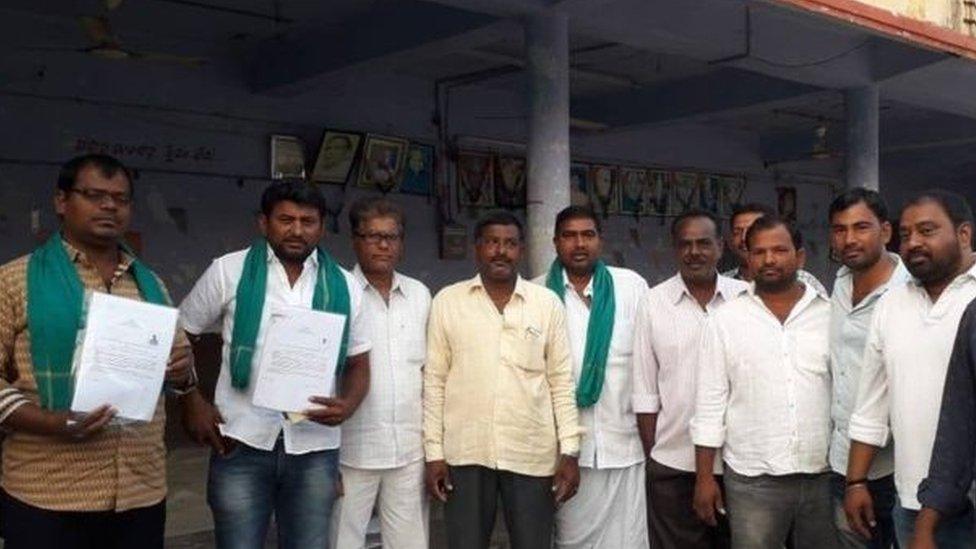
The farmers are running for election as a form of protest
They are contesting as independents from Nizamabad, a seat they chose so they could run against Kalvakuntla Kavitha, who is the sitting MP and daughter of the state's chief minister K Chandrasekhar Rao.
Why does this matter?
It shows how India's deepening agrarian crisis has become a crucial issue in this year's election.
In recent years, farmers across the country have staged large and at times dramatic protests to draw attention to their plight. Agriculture has been adversely affected by a depleting water table and declining productivity, which has meant that many farmers have been caught up in a massive debt trap.
Nizamabad's farmers, for instance, say they have been demanding higher crop prices - which are set by the federal government - for years now. They told BBC Telugu that they were promised price increases during the last election but the government has not delivered.
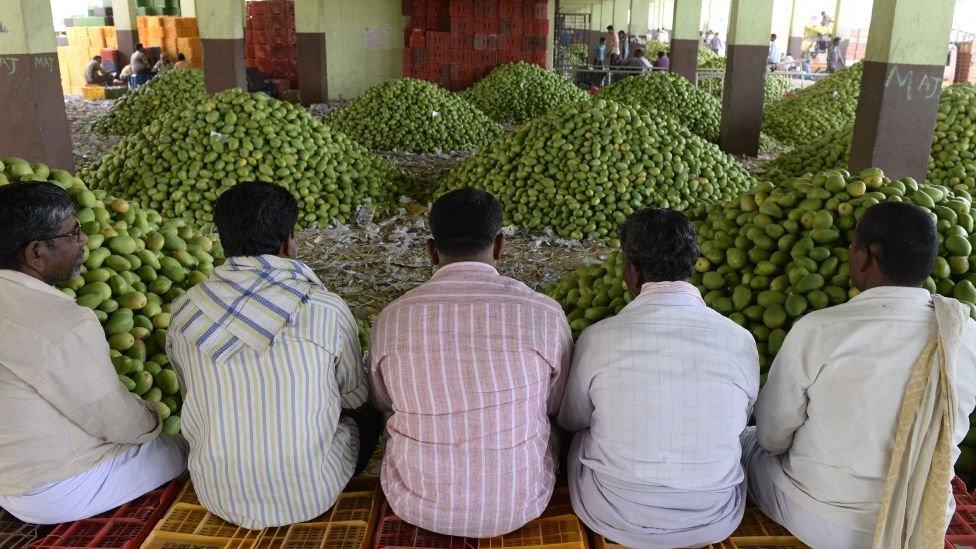
Indian farming has been in crisis for many years
"No matter how much we protested, we did not receive a response," says Venkatesh Kola, a farmer from the village of Armoor, who will be one of those running against Ms Kavitha.
He said they decided to run against Ms Kavitha because she had personally "vowed" that she would not seek their votes again if she did not fulfil their demands. And yet, he added, she was still contesting the election this year.
Mr Kola also said that more farmers had been planning to run as candidates but had been pressured not to by local political leaders.
It is likely that not all of the farmers will end up on the ballot - once filed, nomination forms have to be approved by the election commission.
But as a form of protest, it is still significant.
Ms Kavitha has alleged that the farmers are proxy candidates, propped up by the two national parties - BJP and Congress.

BJP hits back at Congress' income scheme
What happened?
Finance minister Arun Jaitley has slammed the main opposition Congress party after its leader Rahul Gandhi pledged to create "the world's largest minimum income scheme" if his party wins the election.
"A party with such a terrible track record of poverty alleviation has no right to make lofty assurances," Mr Jaitley told reporters on Monday evening, adding that it was a "bluff announcement".
Why does this matter?
The scheme, which guarantees a basic income for 50 million of India's poorest families, is Congress' biggest offering to voters so far.
The Congress first mentioned an income scheme in January amid rumours that the government was preparing to unveil a similar programme.
That never happened. So, Mr Gandhi's announcement was seen by some, including activist Prashant Bhushan, as the Congress beating the BJP to the punch.
Allow X content?
This article contains content provided by X. We ask for your permission before anything is loaded, as they may be using cookies and other technologies. You may want to read X’s cookie policy, external and privacy policy, external before accepting. To view this content choose ‘accept and continue’.
Given the scale of the scheme, it is likely to capture the imagination of voters -which could be a threat to the BJP.
Mr Jaitley took to social media on Monday, where he posted a lengthy response, outlining how the BJP has supported the poor while attacking the Congress' policies.
"No political party has betrayed India for more than seven decades other than the Congress Party," he wrote in a Facebook post.
Allow X content?
This article contains content provided by X. We ask for your permission before anything is loaded, as they may be using cookies and other technologies. You may want to read X’s cookie policy, external and privacy policy, external before accepting. To view this content choose ‘accept and continue’.
Other ministers also joined the attack.
"This showing of false dream to the people of India, is not going to cut any ice because the Congress record of 55 years has always been anti-poor," information minister Ravi Shankar Prasad told local media.
French economist Thomas Piketty, noted for his work on income inequality, told the BBC he supports "all efforts to reduce income inequality in India" and "to move away the political debate from caste-based political to class-based redistribution of income and wealth."
But some Indian economists have questioned the preference for targeted schemes over universal ones.
Allow X content?
This article contains content provided by X. We ask for your permission before anything is loaded, as they may be using cookies and other technologies. You may want to read X’s cookie policy, external and privacy policy, external before accepting. To view this content choose ‘accept and continue’.


On Monday... the battle for UP got ugly
What happened?
It was the last day for political parties to hand in their nominations for the first phase of voting that begins 11 April. And campaigning has started in earnest, warts and all.
In the politically crucial state of Uttar Pradesh, the chief minister, firebrand Hindu monk Yogi Adityanath, referred to one of the opposition Congress party candidates - a Muslim named Imran Masood - as the "son-in-law" of militant Masood Azhar.
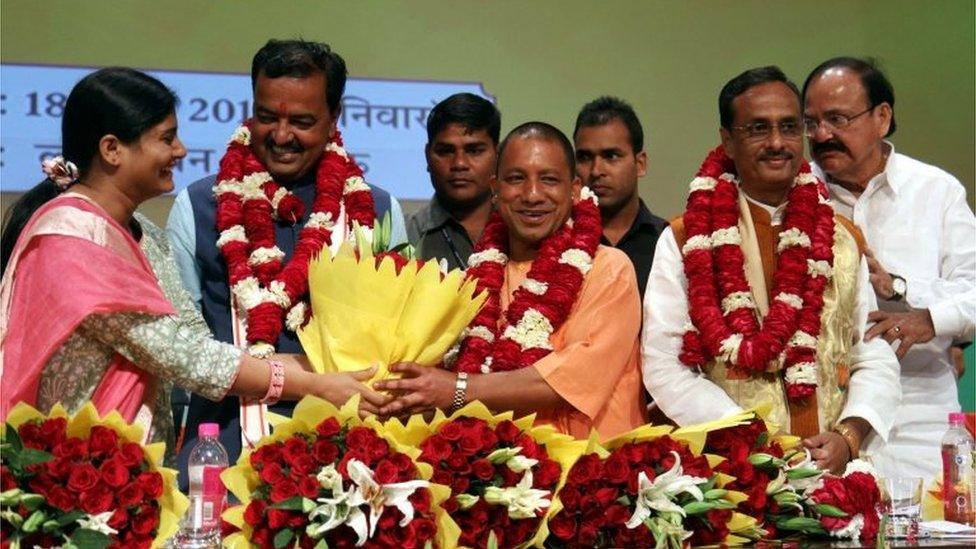
Azhar is the Pakistani-based founder of the militant group Jaish-e-Mohammad, which in February carried out a suicide attack in Indian-administered Kashmir that killed 40 troops and sparked tit-for-tat strikes between India and Pakistan.
Why does this matter?
Mr Adityanath's comments indicate what tone the campaigning is going to take in the days leading up to voting in Uttar Pradesh, which sends the most number of MPs to parliament
However, Imran Masood is also a controversial figure. He was arrested in 2014 after a speech in which he threatened Mr Modi, saying he would "cut him into pieces".
"Saharanpur [constituency] also has the son-in-law of Azhar Masood, who speaks in his language. You have to decide whether you will elect a person who speaks in Azhar Masood's language or Modi-ji's lieutenant in Raghav Lakhanpal, who will ensure development for all," Yogi Adityanath said at a rally on Sunday.
In 2014, the Bharatiya Janata Party (BJP), of which Mr Adityanath is a member, swept Uttar Pradesh with what political commentators described as a clever mix of communal division and promises of development.
Mr Adityanath seems to be following a similar formula this time around.
In the wake of the Kashmir suicide attack a tough stance on Pakistan has become a major theme of the BJP's campaign. On Sunday India's foreign minister Sushma Swaraj had a Twitter spat with Pakistan's information minister over a news report that two Hindu girls had been abducted and forcibly married off in Pakistan.

What happened last week?
You can read a full recap of everything that happened here.
But here are the highlights:
The week began with a tussle for the state assembly of Goa, following the death of its chief minister Manohar Parrikar. His death sparked some late-night political wrangling as the BJP rushed to retain its hold over the coalition government in the wake of a challenge from the opposition Congress party which tried to woo away some independent lawmakers. However, the BJP prevailed and swore in new chief minister Pramod Sawant on Tuesday.
Wednesday was all about Dalit leader Mayawati who delivered a poll shock by saying she would not contest the general election. She said she would instead concentrate on ensuring the victory of the coalition between her Bahujan Samaj Party (BSP) and regional rival Samajwadi Party (SP).
Thursday saw a break for the spring festival of colours Holi, although the BJP released its first list of candidates for the polls later that night. Highlights included the fact that Prime Minister Narendra Modi would contest once again from the northern city of Varanasi, and the official sidelining of party stalwart LK Advani in favour of BJP president Amit Shah.
Friday ended with fire and fury as the prime minister went after several opposition leaders and those associated with opposition parties. He launched a particularly fierce attack on Sam Pitroda, a close aide of the Congress government who is credited with being the father of the Indian telecom revolution. He picked up an interview in which Mr Pitroda objected to "vilifying all Pakistanis" over the Kashmir suicide attack, and accused him of demeaning the armed forces and supporting terrorism.
The Congress meanwhile unveiled its much anticipated alliance with the regional Rashtriya Janata Dal (RJD) in the northern state of Bihar. And former Indian cricketer Gautam Gambhir joined the BJP, saying: "I have been influenced by the prime minister and his vision for the country."

Coverage from previous weeks:

How do the Lok Sabha elections work?
India's lower house of parliament, the Lok Sabha, has 543 elected seats. Any party or coalition needs a minimum of 272 MPs to form a majority government.
Some 900 million voters - 86 million more than the last elections in 2014 - are eligible to vote at 930,000 polling stations.
Electronic Voting Machines (EVMs) will be used at all polling stations. The entire process will be overseen by the Election Commission of India.
Who are the main players?
Prime Minister Narendra Modi who won a landslide victory in 2014 is seeking a second term for both himself and his Bharatiya Janata Party (BJP).
His main challengers are the main opposition Congress party led by Rahul Gandhi, and a consortium of regional parties called the Mahagathbandhan (which translates from the Hindi into massive alliance).
The Mahagathbandhan has seen some of India's strongest regional parties, including fierce rivals, come together.
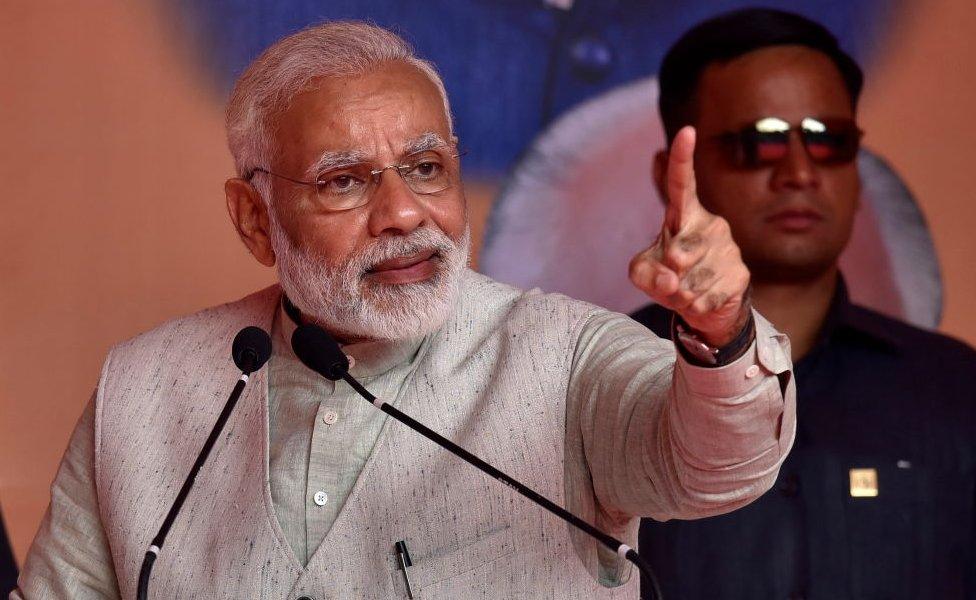
Many see the upcoming election as a referendum on Narendra Modi
This includes the Samajwadi Party (SP) and the Bahujan Samaj Party (BSP) led by Dalit icon Mayawati, normally fierce rivals in the northern state of Uttar Pradesh, which sends the most number of MPs to parliament.
The alliance also includes the Trinamool Congress which is in power in the state of West Bengal and Arvind Kejriwal whose Aam Aadmi Party (AAP) rules Delhi.
The aim of the alliance is to consolidate regional and anti-BJP votes, in order to oust Mr Modi from power.
Other regional players including Tamil Nadu's DMK and AIADMK and Telangana's TRS in the south are not part of the alliance, but are expected to perform well in their own states, which is likely to make them key to any coalition government.
When do I vote? The dates at a glance
11 April: Andhra Pradesh (25), Arunachal Pradesh (2), Assam (5), Bihar (4), Chhattisgarh (1), J&K (2), Maharashtra (7), Manipur (1), Meghalaya (2), Mizoram (1), Nagaland (1), Odisha (4), Sikkim (1), Telangana (17), Tripura (1), Uttar Pradesh (UP) (8), Uttarakhand (5), West Bengal (2), Andaman & Nicobar (1), Lakshadweep (1)
18 April: Assam (5), Bihar (5), Chhattisgarh (3), Jammu and Kashmir (J&K) (2), Karnataka (14), Maharashtra (10), Manipur (1), Odisha (5), Tamil Nadu (39), Tripura (1), UP (8), West Bengal (3), Puducherry (1)
23 April: Assam (4), Bihar (5), Chhattisgarh (7), Gujarat (26), Goa (2), J&K (1), Karnataka (14), Kerala (20), Maharashtra (14), Odisha (6), UP (10), West Bengal (5), Dadar and Nagar Haveli (1), Daman and Diu (1)
29 April: Bihar (5), J&K (1), Jharkhand (3), MP (6), Maharashtra (17), Odisha (6), Rajasthan (13), UP (13), Bengal (8)
6 May: Bihar (1), J&K (2), Jharkhand (4), Madhya Pradesh (MP) (7), Rajasthan (12), UP (14), Bengal (7)
12 May: Bihar (8), Haryana (10), Jharkhand (4), MP (8), UP (14), Bengal (8), Delhi (7)
19 May: Bihar (8), Jharkhand (3), MP (8), Punjab (13), Bengal (9), Chandigarh (1), UP (13), Himachal Pradesh (4)
23 May: Votes counted
Key: Date: State (number of seats being contested))

- Published22 May 2018
- Published8 June 2017
- Published18 March 2019
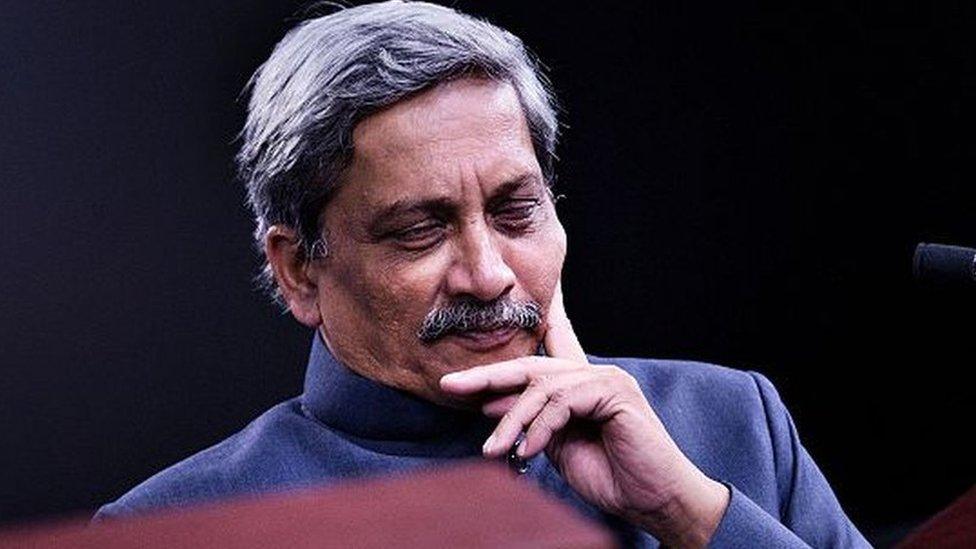
- Published10 April 2019
- Published12 December 2018